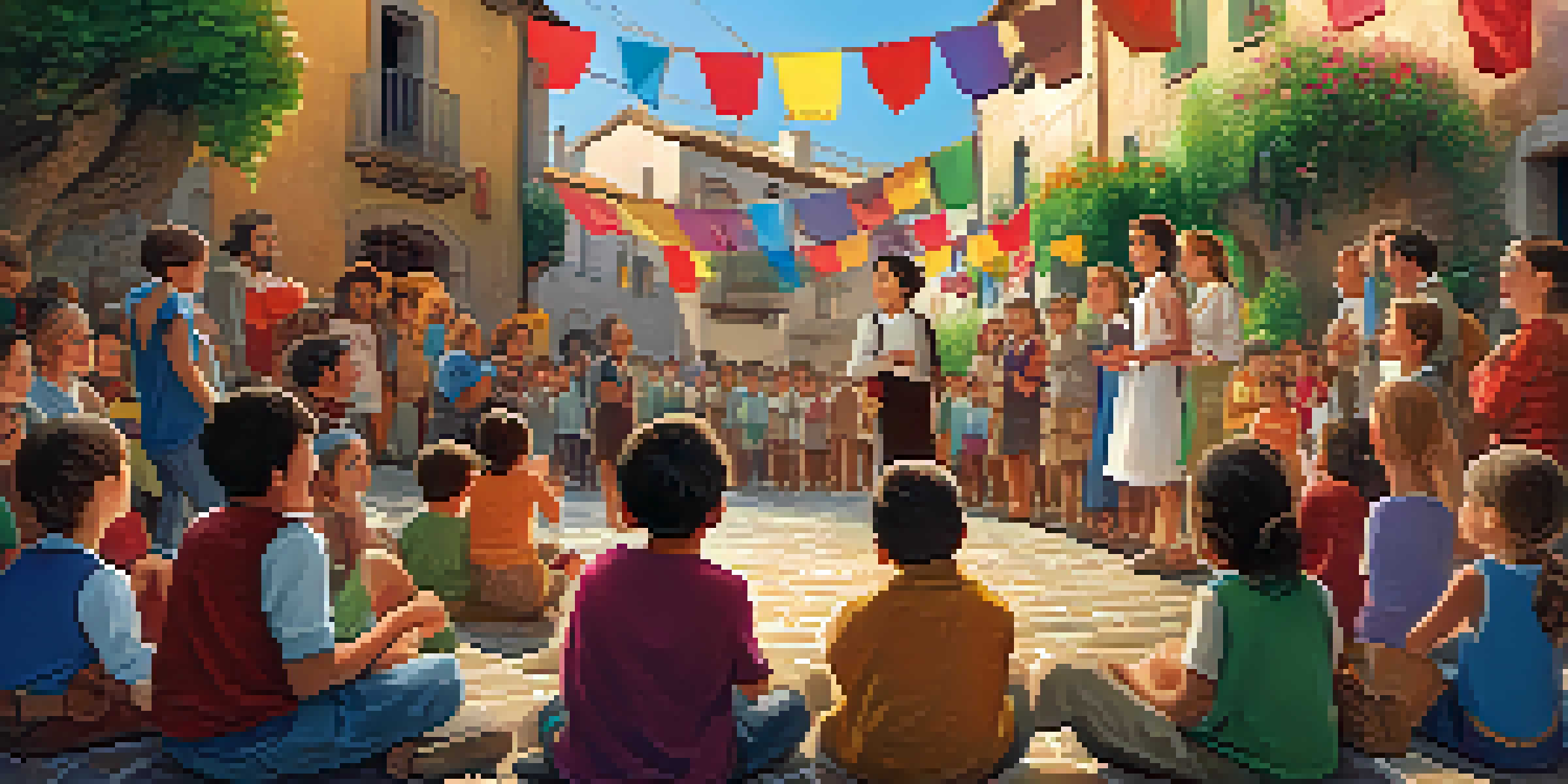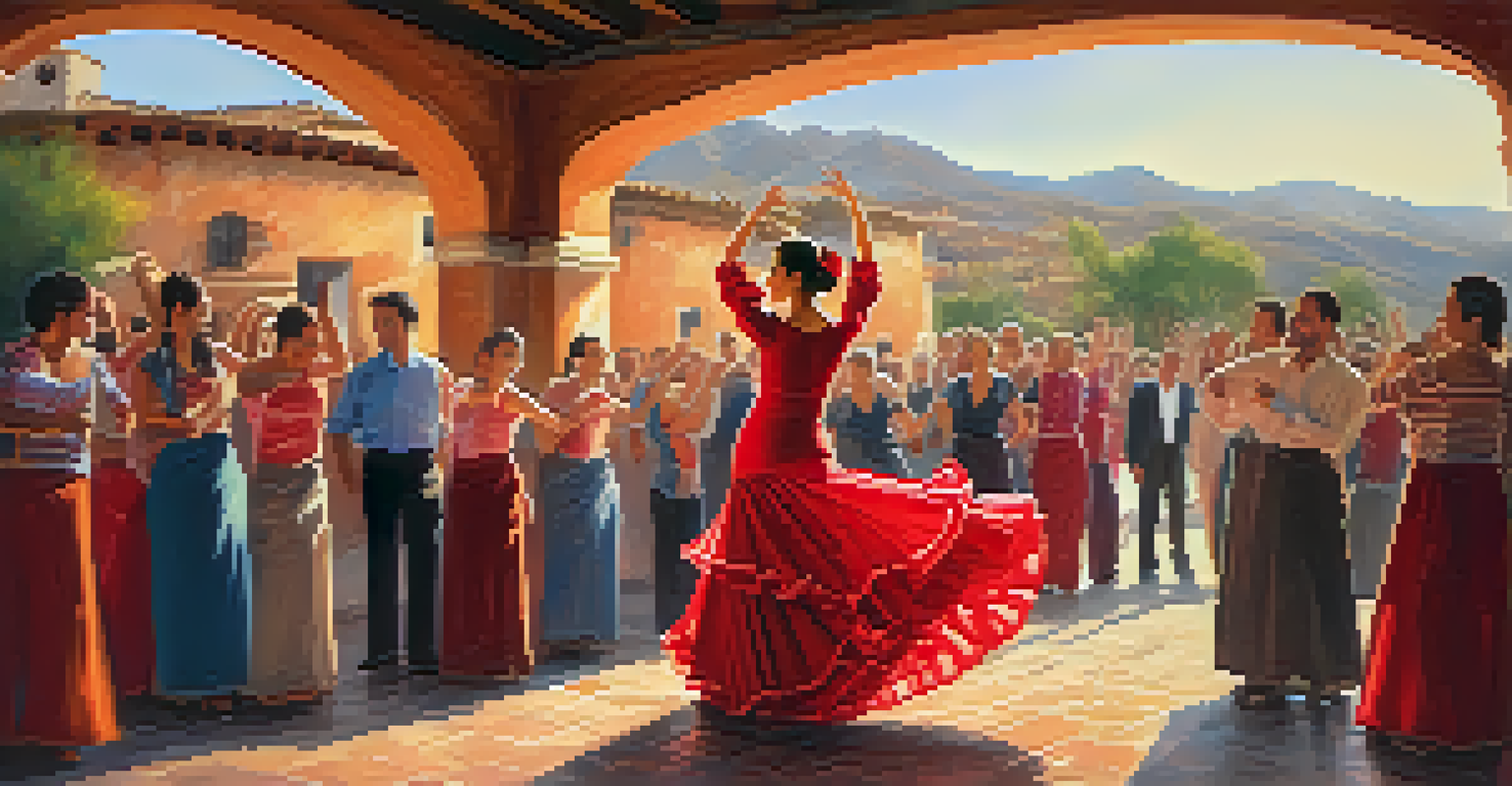The Role of Oral Traditions in Spanish Cultural Identity

Understanding Oral Traditions in Spain's Cultural Landscape
Oral traditions are an integral part of Spain's rich cultural history, serving as a vessel for storytelling across generations. They encompass a variety of forms, including folktales, legends, and songs, capturing the essence of Spanish life and values. These narratives not only entertain but also educate, preserving historical events and social norms that might otherwise be forgotten.
Stories are the threads that weave the fabric of our culture and identity.
In Spain, oral traditions vary significantly from region to region, reflecting the diverse identities within the country. For instance, the Andalusian tradition of flamenco music and dance conveys deep emotional stories, while Galician oral legends often involve mystical elements tied to nature. This regional diversity enriches the overall tapestry of Spanish culture, making it more vibrant and unique.
Moreover, oral traditions foster a sense of belonging and community among people. They are often shared in gatherings, celebrations, and family events, creating bonds that transcend generations. Through these shared stories, individuals connect with their ancestry, reinforcing their cultural identity and heritage.
Key Elements of Spanish Oral Traditions
One of the primary elements of Spanish oral traditions is the use of language, which varies not only in dialect but also in style and expression. The way stories are told can change dramatically based on the storyteller's background, region, and audience. This linguistic richness adds depth to the narratives, making them more relatable and engaging for listeners.

Another essential component is the role of music and dance, which often accompany oral storytelling in Spain. Genres like copla and zarzuela integrate sung narratives that enhance the emotional impact of the tales being told. These musical forms create a multisensory experience, allowing audiences to feel the rhythm of the stories while connecting with their cultural roots.
Cultural Identity through Stories
Oral traditions play a crucial role in preserving Spanish cultural identity by connecting individuals to their history and heritage.
Additionally, the themes explored in oral traditions frequently revolve around universal human experiences such as love, loss, and resilience. These themes resonate with people from various backgrounds, enabling oral traditions to transcend cultural boundaries and foster mutual understanding. The shared emotions within these stories help reinforce the collective identity of the Spanish people.
The Impact of Oral Traditions on Spanish Identity
Oral traditions play a crucial role in shaping the Spanish cultural identity by preserving collective memory and historical narratives. They serve as a reminder of the past, allowing individuals to understand their roots and the events that have shaped their communities. This connection to history fosters a sense of pride and belonging among the Spanish population.
Oral traditions are not just stories; they are the bridge between our past and our future.
Furthermore, oral traditions contribute to the ongoing discourse of identity in contemporary Spain. As society evolves, new stories emerge that reflect current issues and experiences, allowing traditional narratives to adapt and remain relevant. This dynamic interaction between the past and present ensures that cultural identity continues to flourish.
In essence, oral traditions act as a bridge between generations, connecting the wisdom of the past with the aspirations of the future. By passing down stories, values, and lessons, these traditions provide a framework for understanding one's place in the world, reinforcing the significance of cultural heritage in shaping identity.
Regional Variations of Oral Traditions Across Spain
Spain's diverse regions boast unique oral traditions that reflect their local histories and cultures. In Catalonia, for instance, the tradition of 'Els Castells' involves building human towers, which is often accompanied by legends explaining their origins. This practice not only showcases physical skill but also symbolizes community and cooperation, deeply rooted in Catalan pride.
In contrast, the Basque Country is known for its rich oral storytelling tradition, often featuring mythical creatures and heroic figures. These tales, passed down through generations, highlight the values of bravery and loyalty that are significant in Basque culture. Such regional stories help to preserve local dialects and traditions, creating a distinct cultural identity.
Regional Diversity in Narratives
Spain's oral traditions vary significantly across regions, reflecting the unique identities and histories of local communities.
These variations highlight the importance of place in shaping oral traditions, as they are influenced by geography, history, and the social fabric of each community. Each region's unique narratives contribute to the overall cultural mosaic of Spain, illustrating the richness and complexity of Spanish identity.
The Role of Oral Traditions in Education
Oral traditions serve as valuable educational tools, particularly in teaching younger generations about their cultural heritage. Through storytelling, children learn about moral values, community history, and social responsibilities in an engaging manner. This method of learning fosters curiosity and encourages critical thinking as they explore the meanings behind the stories.
In many communities, elders play a vital role in passing down these traditions, acting as custodians of knowledge. This intergenerational exchange not only strengthens family bonds but also reinforces respect for elders and their wisdom. By engaging with oral traditions, younger individuals gain a deeper appreciation for their culture and its significance.
Moreover, as schools and educational institutions increasingly recognize the value of oral traditions, they are incorporating them into curricula. This approach not only enriches students' learning experiences but also helps preserve these narratives in a modern context, ensuring that they remain relevant and accessible in today's world.
Challenges Facing Oral Traditions in Modern Spain
Despite their significance, oral traditions in Spain face several challenges in the modern era. Rapid globalization and technological advancements have shifted the way stories are shared, sometimes overshadowing traditional forms of storytelling. As younger generations become more engrossed in digital media, there is a risk that these valuable narratives may be forgotten or diluted.
Additionally, the decline in traditional community gatherings, where storytelling often takes place, poses a threat to the transmission of oral traditions. As lifestyles become busier and more fragmented, opportunities for intergenerational sharing are diminishing. This shift can lead to a disconnect between younger and older generations regarding cultural knowledge.
Challenges of Modern Storytelling
Despite their importance, oral traditions face challenges from globalization and changing lifestyles that threaten their transmission.
However, many communities are actively seeking to revitalize their oral traditions through workshops, festivals, and storytelling events. By embracing both traditional and modern methods, they aim to keep these narratives alive and relevant, ensuring that future generations continue to engage with and appreciate their cultural heritage.
The Future of Oral Traditions in Spanish Culture
Looking ahead, the future of oral traditions in Spain appears promising, as many individuals and organizations are committed to their preservation. By leveraging technology, such as podcasts and social media, storytellers can reach wider audiences, sharing their narratives in innovative ways. This blend of tradition and modernity can help sustain interest in oral storytelling.
Furthermore, educational initiatives focused on oral traditions are gaining traction, with schools incorporating storytelling into their programs. These efforts not only nurture a love for storytelling among students but also promote cultural diversity and understanding. As young people become storytellers themselves, they contribute to the evolving landscape of oral traditions.

Ultimately, the future of oral traditions in Spanish culture depends on the collective efforts of communities, educators, and storytellers. By valuing and celebrating these narratives, Spain can ensure that its rich cultural heritage continues to thrive, connecting the past with the present and inspiring future generations.